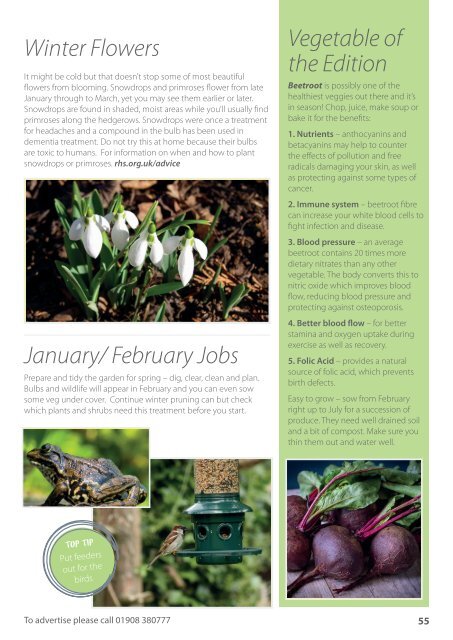EL Magazine JAN-FEB 2019
Create successful ePaper yourself
Turn your PDF publications into a flip-book with our unique Google optimized e-Paper software.
Winter Flowers<br />
It might be cold but that doesn’t stop some of most beautiful<br />
flowers from blooming. Snowdrops and primroses flower from late<br />
January through to March, yet you may see them earlier or later.<br />
Snowdrops are found in shaded, moist areas while you’ll usually find<br />
primroses along the hedgerows. Snowdrops were once a treatment<br />
for headaches and a compound in the bulb has been used in<br />
dementia treatment. Do not try this at home because their bulbs<br />
are toxic to humans. For information on when and how to plant<br />
snowdrops or primroses. rhs.org.uk/advice<br />
January/ February Jobs<br />
Prepare and tidy the garden for spring – dig, clear, clean and plan.<br />
Bulbs and wildlife will appear in February and you can even sow<br />
some veg under cover. Continue winter pruning can but check<br />
which plants and shrubs need this treatment before you start.<br />
Vegetable of<br />
the Edition<br />
Beetroot is possibly one of the<br />
healthiest veggies out there and it’s<br />
in season! Chop, juice, make soup or<br />
bake it for the benefits:<br />
1. Nutrients – anthocyanins and<br />
betacyanins may help to counter<br />
the effects of pollution and free<br />
radicals damaging your skin, as well<br />
as protecting against some types of<br />
cancer.<br />
2. Immune system – beetroot fibre<br />
can increase your white blood cells to<br />
fight infection and disease.<br />
3. Blood pressure – an average<br />
beetroot contains 20 times more<br />
dietary nitrates than any other<br />
vegetable. The body converts this to<br />
nitric oxide which improves blood<br />
flow, reducing blood pressure and<br />
protecting against osteoporosis.<br />
4. Better blood flow – for better<br />
stamina and oxygen uptake during<br />
exercise as well as recovery.<br />
5. Folic Acid – provides a natural<br />
source of folic acid, which prevents<br />
birth defects.<br />
Easy to grow – sow from February<br />
right up to July for a succession of<br />
produce. They need well drained soil<br />
and a bit of compost. Make sure you<br />
thin them out and water well.<br />
TOP TIP<br />
Put feeders<br />
out for the<br />
birds<br />
To advertise please call 01908 380777<br />
55

















